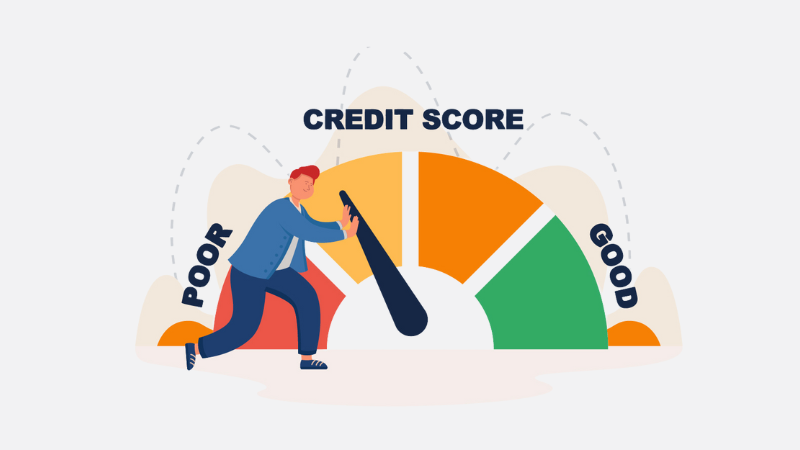The CIBIL report is a record of your borrowing behaviour that influences your CIBIL score. A score of 750 or higher unlocks better loan terms, but even lower scores can be improved with diligent effort.
What is a good credit score in India?
Your CIBIL report tells lenders about your past credit habits. CIBIL score ranges between 300 and 900. The closer the score is to 900, the better your chances of availing a loan or even a credit card. While a 750+ score offers benefits, even if your score isn’t ideal, there are steps you can take to boost it and secure better loan terms.
One should keep in mind that multiple factors can impact their credit score, but there are also multiple ways to improve it.
In this article, we will be discussing a few tactics on how to increase your CIBIL score and your creditworthiness.
CIBIL score range table:
| CIBIL Score Range | Credit Category |
| 300 to 500 | Poor |
| 500 to 650 | Average |
| 650 to 750 | Good (*Easy to get loan approvals) |
| 750 to 900 | Excellent |
The CIBIL score range table provides a concise overview of credit scores, categorizing them into different ranges to help individuals understand their creditworthiness. Look at the table to know in which category you belong in the CIBIL score range:
A few clicks to fix your CIBIL mix
13 smart ways to improve CIBIL score:
1. Clear Existing Debt:
Clearing your existing debts is akin to laying a solid foundation for your financial future. It’s not just about how to increase your credit score, but it’s also about taking control of your finances. Outstanding credit card balances and unpaid loans not only drag your credit score down, but also accrue hefty interest charges that can erode your financial stability. Prioritizing debt repayment is the first and crucial step in your journey toward financial health.
2. Maintain Older Credit Cards for Extended Credit History:
In the world of credit, age matters. The length of your credit history is a critical component of your credit score. By keeping your older credit cards active, you not only maintain a longer credit history but also showcase your ability to manage credit responsibly over an extended period. This is highly regarded by credit bureaus and can significantly enhance your creditworthiness.
3. Ensure Timely Payment of Loans/Credit Card Bills:
The backbone of a strong credit profile is a track record of timely bill payments. Consistently paying your credit card bills and loan instalments on time demonstrates your reliability as a borrower. Late payments not only attract penalties and higher interest rates but also cast a shadow on your credit score. To steer clear of this pitfall, consider setting up payment reminders or automating your payments.
4. Make Timely EMI Payments and Set Reminders Accordingly:
For those with instalment loans, such as car loans or home loans, making on-time EMI payments is paramount. Delinquencies on these payments can not only damage your credit score but also put your valuable assets, such as your car or home, at risk. To ensure you never miss an EMI, set reminders and adhere to a disciplined repayment schedule.
5. Opt for a Longer Tenure When Acquiring a Loan:
When taking out a loan, the tenure you choose can significantly impact your ability to manage your finances. Opting for a longer repayment period can result in lower monthly EMIs, making your loan more manageable and reducing the risk of missing payments. While this may extend the overall duration of the loan, it can contribute positively to your credit history and help to improve CIBIL score.
6. Steer Clear of Accumulating Excessive Debt Concurrently:
Smart money management means not taking on too much debt all at once. Lenders view individuals with a high level of outstanding debt as riskier borrowers. To maintain a healthy credit profile, it’s essential to balance your debt load and ensure that you can comfortably meet your financial obligations.
7. Avoid Owning an Excessive Number of Credit Cards:
Credit cards offer convenience and rewards, but having too many can raise eyebrows among lenders. It may suggest over-reliance on credit. Responsible credit usage involves maintaining a reasonable number of credit cards and managing them wisely, which can significantly bolster your creditworthiness.
8. Tailor Your Credit Limit to Align with Your Expenses:
Requesting a credit limit that matches your income and spending patterns is a smart move. While a high credit limit can be advantageous, it’s only beneficial if you can use it responsibly. Requesting a limit that aligns with your financial capacity helps you avoid accumulating excessive debt and late payments.
9. Establish a Diverse Mix of Loans for a Strong Credit History:
Lenders appreciate borrowers with a diverse credit mix because it demonstrates their ability to manage different types of credit responsibly. A diverse credit portfolio typically includes credit cards, instalment loans (such as car loans), and mortgages. By showcasing responsible management across various credit categories, you can positively impact your credit score.
10. Regularly Review Your CIBIL Report for Any Errors:
Monitoring your credit report is a proactive step if you want to know how to improve CIBIL score. It helps in maintaining a healthy credit profile. Periodically obtaining and scrutinizing your credit report is crucial, as errors or inaccuracies can unfairly tarnish your score. If you discover any discrepancies, take prompt action by disputing them with the relevant credit bureau. Ensuring that your credit report accurately reflects your credit history is essential for maintaining a strong financial reputation and contribute towards improving your credit score.
11. Restrict the Frequency of Loan Applications:
Applying for loans or credit cards frequently can raise red flags among lenders. It may indicate financial instability or desperation for credit, both of which can negatively affect your credit score. Therefore, it’s advisable to apply for credit only when necessary and not to overextend yourself with multiple applications.
12. Keep a Close Eye on Credit Utilization:
Credit utilization refers to the proportion of your credit card balances to your credit limits, which can have a considerable impact on your credit score. Maintaining a high credit utilization, where you are using a significant portion of your available credit, can adversely affect your creditworthiness. To improve your credit score, it is advisable to keep your credit card balances well below their credit limits, ideally not exceeding 30%.
13. Use PayMe’s “Credit Assist” Services to Improve Your CIBIL/Credit Score:
PayMe’s “Credit Assist” services are tailored to provide you with invaluable tools and expert guidance to improve CIBIL score. By leveraging these services, you can access personalized advice and tailored strategies to enhance your CIBIL score. This service can be a game-changer, opening the doors to better financial opportunities, including lower interest rates on loans.
How to use PayMe’s “Credit Assist” service to improve your CIBIL score immediately?
If you’ve faced loan rejections due to a low CIBIL score, PayMe offers an invaluable solution. For a nominal fee, our ‘Credit Assist’ service provides tailored and personalized strategies to improve your credit score, enabling you to swiftly overcome credit hurdles and secure the financial assistance you need.
- Step 1: Go to PayMe’s official website by entering “www.paymeindia.in” into your web browser.
- Step 2: Once on the main page, look for the “Products” section in the website’s menu or homepage. Click on it to access the list of PayMe’s services.
- Step 3: You will find the ‘Credit Assist‘ service. Click on it to learn more about the service and how it can help improve your CIBIL score.
- Step 4: If you’re interested in using the ‘Credit Assist’ service, you may need to sign up or request assistance by clicking on “Try it now”. This will involve filling out a form and providing some basic information.
- Step 5: After signing up or requesting assistance, we will get in touch with you to discuss your specific situation. We will provide you with personalized solutions and strategies to improve your CIBIL score.
- Step 6: Regularly check your credit score to monitor your progress. You can often access your CIBIL score through PayMe’s platform or directly through credit bureaus.
Following the above-mentioned steps will help you improve your CIBIL score, and you’ll be better positioned to secure loans, credit cards, and other financial opportunities that may have been previously out of reach.
Factors that have a negative influence on your credit score:
- Payment History:
Maintaining a high CIBIL score requires timely payments of your monthly credit card bills and loan EMIs. Delays or defaults in payments can significantly impact your score, indicating potential credit management challenges. A recent analysis showed that even a 30-day delinquency could lead to a 100-point drop in your score.
- Credit Utilization Ratio:
While having loans or multiple credit cards doesn’t inherently harm your CIBIL score, a high credit utilization ratio can lower it. Ideally, you should utilize no more than 30% of your credit limit. A higher ratio suggests increasing debt levels and a greater risk of default. It’s essential to monitor your credit expenses to avoid maxing out your limit.
- Credit Type and Duration:
Your credit history’s age, which reflects the years since you opened your first credit account, matters. CIBIL considers the average age of your credit accounts. A balanced mix of secured loans (e.g., car or home loans) and unsecured loans (e.g., credit cards) can positively impact your score, indicating proficiency in managing different account types. A long, well-managed credit history positions you as a low-risk borrower, making it advisable to start building credit early, especially if you plan significant purchases like a house or a car in the future.
- Other Factors:
Credit inquiries are another factor in score calculation. Each time you apply for a loan or credit card, lenders perform a credit report check, known as a hard inquiry. Multiple credit requests within a short timeframe can decrease your score. To maintain your score, it’s best to space out your credit applications throughout the year rather than making them all at once.
Why Is Your Credit Score Important:
Your CIBIL or credit score is crucial because it serves as a financial report card that lenders use to evaluate your creditworthiness. A high score indicates responsible credit management, making it easier to secure loans, credit cards, and favourable interest rates. Conversely, a low score can lead to loan rejections and higher interest rates, potentially limiting your financial options.
Frequently Asked Questions (FAQs):
- How much time does it take to improve a CIBIL score?
Improving your CIBIL score is a gradual process that depends on various factors, including your current score and the steps you take to enhance it. Generally, visible improvements may be observed in about 6 to 12 months of consistent positive credit behaviour.
- How to increase CIBIL score from 500 to 750, 600 to 750, and 650 to 750?
To increase your CIBIL score to 750, regardless of your starting point, focus on making timely payments, reducing outstanding debt, diversifying your credit mix, and maintaining a low credit utilization ratio. Consistency in these actions over time can help you reach your desired score and improve your credit score.
- How to increase CIBIL score without a credit card?
You can enhance your CIBIL score without a credit card by taking steps such as paying bills and EMIs on time, maintaining a mix of different loans (like a car or personal loan), and ensuring a low credit utilization ratio on any existing credit cards. Demonstrating responsible financial behaviour across various credit types can positively impact your score.
- Can closing a credit card improve CIBIL score?
Closing a credit card can sometimes have a negative impact on your score, especially if it’s one of your older accounts. It may reduce your overall credit limit and affect your credit utilization ratio. Consider keeping older cards open to maintain a positive credit history.
- How often should I check my CIBIL score?
Regularly monitoring your CIBIL score is advisable. You can check it annually or before applying for significant loans. Reviewing your report can help you identify errors, track your progress, and ensure your credit history remains accurate and favourable.
Also, read:




